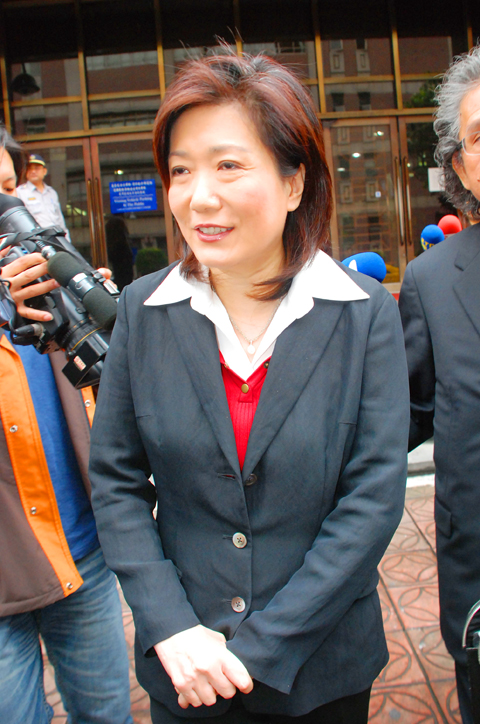Taipei District Court judges presiding over former Chinese Nationalist Party (KMT) legislator Diane Lee’s (李慶安) dual citizenship case yesterday said they may consider trying her for corruption — which carries more serious consequences than the fraud and forgery charges she was indicted for.
During her trial, Lee told the court she did nothing wrong during her terms as legislator. She admitted to being a US citizen during her service, but said she had mistakenly believed that public officials automatically lose their US citizenship status when they are sworn in.
The judges remained skeptical, however, saying that if Lee was misinformed on related legislation, she would not have called on former Taipei deputy mayor Chen Shih-meng (陳師孟) to step down in 1994 when she questioned him regarding his US citizenship.

PHOTO: CNA
The judges have scheduled an additional trial date to decide whether to try Lee for violating the Punishment of Corruption Act (貪污治罪條例).
If convicted of corruption, Lee could face more than seven years in prison.
Speaking to reporters yesterday, Lee said: “We respect the court’s decision.”
Her attorney, Chuang Hsiu-ming (莊秀銘), said they were confident about the case.
Lee’s dual citizenship scandal first emerged in March last year, when the Chinese-language Next Magazine reported that she still possessed a US passport.
The Nationality Act (國籍法) prohibits government officials from holding dual citizenship and requires that those who are dual citizens give up their foreign citizenship before assuming office.
In January, the Taipei District Prosecutors’ Office received official confirmation from the US State Department that Lee’s US citizenship remained valid.
Prosecutors allege that in the personnel forms she filled out as a Taipei City councilor in 1994 and during her three terms as a lawmaker starting in 1998, Lee deliberately left blank the field asking whether she held citizenship from any country other than the Republic of China.
Prosecutors say that the more than NT$100 million (US$3 million) in income Lee earned during her terms as councilor and lawmaker were therefore gained illegally because Lee held the positions illegally.
The money includes NT$22.68 million in income and public funds from her term as city councilor and NT$80.09 million from three terms as legislator.
Lee resigned from the KMT last December and gave up her position early this year.

The Ministry of Economic Affairs has fined Taobao NT$1.2 million (US$36,912) for advertisements that exceed its approved business scope, requiring the Chinese e-commerce platform to make corrections in the first half of this year or its license may be revoked. Lawmakers have called for stricter enforcement of Chinese e-commerce platforms and measures to prevent China from laundering its goods through Taiwan in response to US President Donald Trump’s heavy tariffs on China. The Legislative Yuan’s Finance Committee met today to discuss policies to prevent China from dumping goods in Taiwan, inviting government agencies to report. Democratic Progressive Party Legislator Kuo Kuo-wen (郭國文) said

The Ministry of Economic Affairs has fined Taobao NT$1.2 million (US$36,900) for advertisements that exceeded its approved business scope and ordered the Chinese e-commerce platform to make corrections in the first half of this year or its license would be revoked. Lawmakers have called for stricter supervision of Chinese e-commerce platforms and more stringent measures to prevent China from laundering its goods through Taiwan as US President Donald Trump’s administration cracks down on origin laundering. The legislature’s Finance Committee yesterday met to discuss policies to prevent China from dumping goods in Taiwan, inviting government agencies to report on the matter. Democratic Progressive Party

Taiwan and its Pacific ally Tuvalu on Tuesday signed two accords aimed at facilitating bilateral cooperation on labor affairs, according to Taiwan’s Ministry of Foreign Affairs (MOFA). The governments inked two agreements in Taipei, witnessed by Foreign Minister Lin Chia-lung (林佳龍) and visiting Deputy Tuvaluan Prime Minister Panapasi Nelesone, MOFA said in a news release. According to MOFA, the agreements will facilitate cooperation on labor issues and allow the two sides to mutually recognize seafarers’ certificates and related training. Taiwan would also continue to collaborate with Tuvalu across various fields to promote economic prosperity as well as the well-being of their

Sung Chien-liang (宋建樑), who led efforts to recall Democratic Progressive Party (DPP) Legislator Lee Kun-cheng (李坤城), was released on bail of NT$80,000 today amid outcry over his decision to wear a Nazi armband to questioning the night before. Sung arrived at the New Taipei District Prosecutors’ Office for questioning in a recall petition forgery case last night wearing a red armband bearing a swastika, carrying a copy of Adolf Hitler’s Mein Kampf and giving a Nazi salute. Sung left the building at 1:15am without the armband and covering the book with his coat. Lee said today that this is a serious